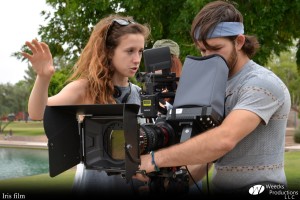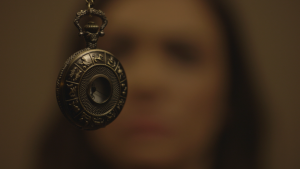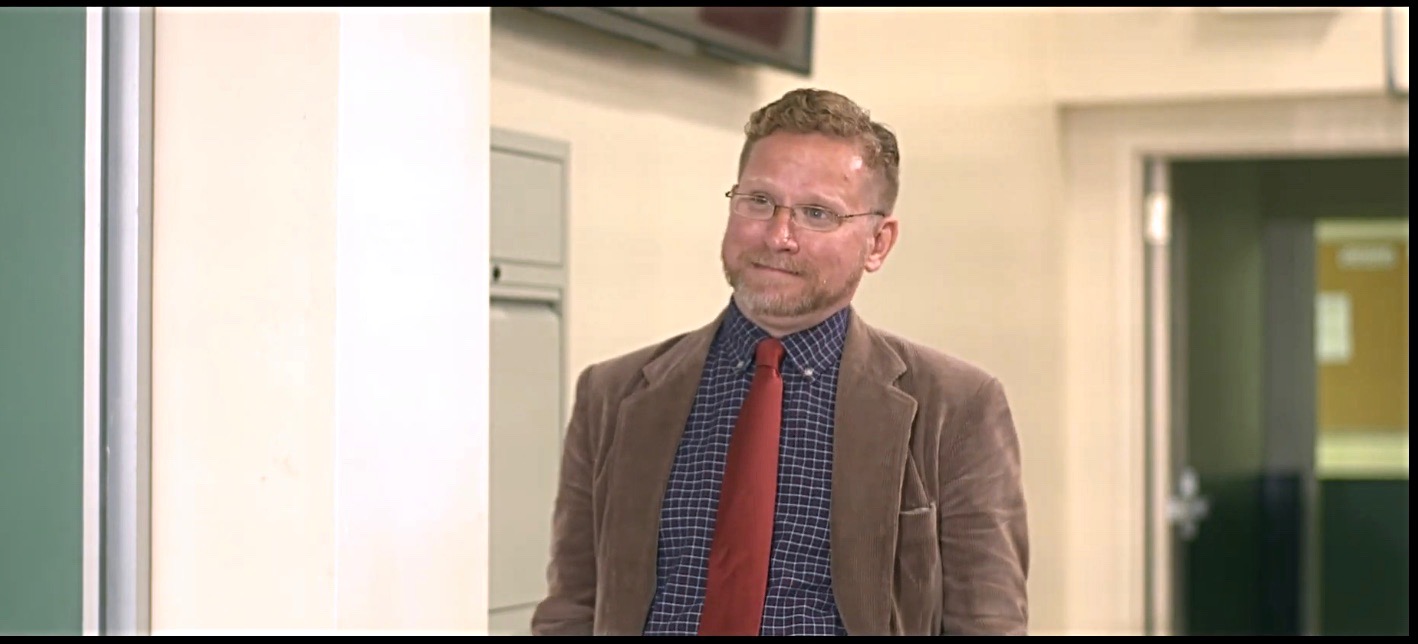
In Their Own Words: Director Chiara Farina of “Iris”
While overall opinions will vary (as with any subject really) in regard to the concept of crowdfunding, one thing is certain, it is currently here to stay. It was thanks to learning about one such campaign on Indiegogo, via Twitter, that lead OneFilmFan.com to discover Arizona-based indie film director Chiara Farina and her new project, “Iris”. Tackling one of hardest subjects to field in suicide, the effort is working to become a tool to raise awareness about these tragic occurrences and also to encourage prevention measures. Thanks to reaching out to Ms. Farina, OneFilmFan.com was able to take her away from a busy filming, and subsequent post-production, schedule to do the following interview about herself, her career, and this newest film effort. So, we present, Ms. Chiara Farina!
One Film Fan: How about starting with just a brief insight into who Chiara Farina is. Likes, dislikes, favorite and not so favorite things, what is it to be a true “life enthusiast”? LOL What makes you, you?
Chiara Farina: I wondered if anyone ever would question me about that! (Laughs) To be a “life enthusiast” means that I embrace every aspect of life. I constantly seek out new experiences, new people, and new adventures. I accept and learn from the low points, but live for those special moments that make life great. Because that’s what really makes it worth living, right? Whether it’s something as big as a trip to Europe or as small as the rainbow you saw after a storm, those are the things you can look back on and say, “You know what, life is actually pretty awesome sometimes.”
As far as what makes me, me… That’s quite a question. I am, first and foremost, a writer and an adventurer. Being a filmmaker accentuates that. I love traveling and, as previously mentioned, experiencing new things. My friends always say, if I’m not busy with school, work, or a film, I’m going on a trip somewhere. I don’t like to feel stagnant; I always need to either be going someplace or doing something.
I’m drawn to the human experience, particularly the human experiences of emotion and hope. Those, to me, are the most powerful experiences we have – and love is included in that, of course. That’s why I love meeting new people. I love observing others and helping others. If I could leave a single mark upon the world, I would prefer it to be in the form of inspiring someone for the better.
On another note, I’m also an avid animal lover. I feel like I have to mention that when I talk about myself. If there’s ever an animal in the room, almost doesn’t matter what kind, you can bet that one of the first things I will do will be to beeline it to that animal.
O.F.F.: How were you first drawn to the film industry? When did it become evident that involvement in it was going to be your career choice?
C.F.: I came into the film industry through my writing. When I was about to graduate high school, I wanted to decide upon a degree concentration for my college applications. I knew I wanted to do something creative and literary-related; however, I’d tried journalism and knew it wasn’t for me. So, I found film. I thought it might be cool to bring my stories to life in a visual way. By the first semester of my college career, I’d fallen in love with all aspects of the medium. I was hooked. And the rest is history.
O.F.F.: How did you further learn the art (ie: mentors, influences, and schooling)?
C.F.: I currently study film at Arizona State University. I graduate this December! Through the school, I have some fantastic mentors. The primary three would be Gregory Maday, Janaki Cedanna, and Jason Scott. Greg is my main writing mentor; I’ve been studying independently with him for years. I’ve learned a ton about TV writing and the industry through him. Prof. Cedanna and Prof. Scott are both my mentors for “Iris”. Prof. Cedanna has given me loads of help with the technical side, and Prof. Scott is helping me fine-tune my marketing and promotional skills.
Beyond ASU, much of my film education came about through working in Arizona’s independent industry. You can’t learn everything from a classroom – you’ve really gotta just get out there and do it. In the real world, you learn about working with different people, different positions you might not explore otherwise, varying working styles, and the all-important technique of networking. More than that, you get to hone your skills and make connections along the way. I learned more this way that I ever did in school.
Then, of course, every time I watch a movie I like, I’m inspired. That always influences me. I could probably go on forever about my influences. At the end of the day, everything influences me – everything I see, everything I learn, and everything I experience. Inspiration is all around us, all the time.
O.F.F.: You indicate on your Twitter profile being a Writer, Director, and Script Supervisor. Can you expand a little on those aspects of your journey to date?
C.F.: Well, as aforementioned, I’ve always been a writer. Screenwriting was just the natural progression once I decided to go into film. Since then, I’ve written two features (with another one or two in the works), one TV series (with another in the works), and too many shorts to count.
Directing was also an immediate desire I had when I went into film. “Iris” will be the sixth film I’ve directed, not including minor projects I created by myself. Although it doesn’t say it on my Twitter profile (I should really add it), I also work very often as an Assistant Director.
I didn’t know what script supervising was until my second semester of college. I saw it in a job posting and thought, “Well, I like scripts. I’m sure I could be a script supervisor”. So I looked up what the job entailed, got the job, and did it. The company liked me, kept using me, referred me to others, and now I work in the position all the time. I actually love it.
O.F.F.: So, onto your current project, “Iris”, now filmed and in post-production. What drew you to write/direct this film and its story?
C.F.: “Iris” is not only a personal project, but also my honors thesis project for graduation. My original intent was to write a non-linear, psychological short. When I went to write the story, I was actually undergoing a period of writer’s block. I didn’t know what to write. So, I wrote the first two lines of dialogue and just kept going. Until halfway through the script, I didn’t know where I was going with it.
Yet as the story unfurled, it came from an emotional place deep within me. It came directly from my experiences with the world, reflecting in many ways my own personal journey up to this point. “Iris” became a more powerful, thought-provoking story than I ever could’ve imagined when I first set out to write it. It’s exactly the kind of film I’ve always wanted to direct.
O.F.F.: Tell us a little about the characters involved.
C.F.: The main character is Alix, a girl dealing with depression as she struggles to find purpose, hope, and meaning in her life. Then there’s Nancy, her materialistic yet well-meaning mother, and George, the step-father that tries too hard in all the wrong ways. Also in the cast is Kevin, Alix’s best friend, who doesn’t know how to reach her, Rick, her loving and accepting boss and friend, the Counselor, the one who helps her delve into her memories, and Lacey, the girl who changes Alix’s life.
O.F.F.: From following the film’s Facebook Page, you’ve recently cast Christine Conger, Reavis Dorsey, Skyler Shelley, Mark DeBoer, Cecil Laird, Tom Hall, and others. Sounds like a very full, talented house! How has the process been to audition and cast these actors and actresses? What set some of them apart for the roles you had pictured?
C.F.: We cast the film through two separate calls – a private and then a public. My assistant casting director, Leo Taylor, and I first went through our personal repertoires to select actors we thought would be good for the different roles. Then we reached out to them personally and asked them to audition. When that was done, I posted a public casting call to fill the remaining slots. We also accepted video auditions. We got a lot of responses, and had an excellent turnout. Everyone who auditioned was very good, so it was a tough decision. Leo and I sat in his living room going over the auditions for hours to select the final cast.
In the end, the actors we selected just simply were their roles, and they meshed well together as a cast, both aesthetically and in their mannerisms. Skyler was actually a first alternate for either Alix or Lacey, but I’m incredibly glad that she got to be Lacey, because let me tell you, she was meant to be that character,
Chris’s journey was a little different. She wasn’t originally on the audition list at all. We had a sign on the door to the audition room, and she walked in thinking it was an audition for a different film! Luckily, we’d had a cancellation and there was a slot open later that afternoon. She came back and as soon as she performed the cold read, which was a monologue about depression from the film, we knew she was probably going to be Alix.
I’ve been humbled by the extreme amount of talent I was able to work with on this film. Everyone was amazing and absolutely perfect. I couldn’t have asked for a better cast, and I was honored to work with each and every one of them.
O.F.F.: This film is going to address a very powerful and hard subject matter in suicide. What is your ultimate hope with this film and the themes it will explore?
C.F.: “Iris” is, first and foremost, a film about hope. There are other subthemes, of course, such as time, memory, and relationships that will make people think. I want to make people think; I want to make them question things and force them to consider what does and does not actually need to matter. However, my main intention is to remind people that no matter how difficult life gets, there’s always something beautiful in this world to make it worth living. There’s always hope that things will get better. And that in of itself is a beautiful thing.
O.F.F.: In what ways do you plan to distribute the film once it is completed? Via Film Festivals, etc?
C.F.: I will send it out to film festivals first, yes. I imagine that circuit will expand over a year or two, depending on how it does. I would like to get it to the big name festivals, such as Sundance, Toronto, etc., rather than just keeping it local. I want its reach to be as wide as possible. Once its festival circuit is over, I intend to release it either for free or for a very nominal fee through non-profit organizations in support of mental health so that the film can reach the people who need to hear its message most.
O.F.F.: This reviewer has found that the world of independent cinema is truly a place that needs to be more known, as the more character and story-driven nature of the genre is sorely needed is a CGI-swamped arena. Would you agree and further thoughts on indie film?
C.F.: I definitely agree. I feel like we as a public have become much too reliant upon spectacle for entertainment. If filmmakers want to tell a heavily character-driven or emotional story, they have to hide it in a mess of CGI and computer-general special effects. We shouldn’t need that to tell a good, successful story. That’s why indie film is so special; they can be practical, they don’t need to be franchised, and they can tell stories that a Hollywood production company might not be willing to risk funding. Indie filmmakers get to experiment and take risks. Through that, they make some truly amazing films. More people need to be able to see these films.
O.F.F.: What advice would you give to someone looking to get into the film industry in general?
C.F.: If you want to do something, you have to go out there and do it. You can’t rely on someone to get your foot in the door for you. Sure, it happens, but don’t expect it. Get as much experience as you can. Work on as many films as you can, and try out every position until you find your niche. It always helps to be well rounded, so don’t think you’re “too good” or “not good enough” for a certain role. You’re not, and learning that other role will ultimately make you better at the role you really want. But of course, do the thing you love most as much as possible. In the words of Epictetus, “If you wish to be a writer, write”. The same goes for everything else. Be kind and respectful to everyone, and help out on set as much as you can – even if that means you’re asked to fill in for other positions.
Be eager to learn and eager to help, and don’t be afraid to get your hands dirty, so to speak. Also, you need to network. Make business cards. Dress up and go to those networking events. Meet people. Swap information with people you respect when you work with them. Finally, the biggest advice I can give is not to give up. Film is a competitive industry, and rejection is everywhere. Expect to be rejected often, and don’t let it keep you down. If J.K. Rowling accepted rejection, we never would’ve had “Harry Potter”. If George Lucas accepted rejection, we never would’ve had “Star Wars”. So if you accept rejection, who knows what we might lose. The world is not in consensus. Not everyone will like you. And that’s okay.
O.F.F.: A traditional final question for you! What is YOUR favorite film of all time? Why?
C.F.: “Mr. Nobody” by Jaco Van Dormael. It’s streaming on Netflix; if you haven’t seen it, go watch it right now. A week after seeing it for the first time, I was sitting in a café watching people and I realized that my whole perspective on life had changed. It’s a gorgeous film that challenges your perception of time and the power of choice, and the transitions are simply mind-blowing. It’s my ideal kind of film that I’d like to make, and it was a big inspiration for “Iris”.
A wonderfully in depth look into the very being of another indie film director’s life, mind, and mindset in coming up with what should truly amount to a powerful, emotional, and deeply meaningful effort called “Iris”! And it is thanks to indie film fans and their contributions towards this effort that has made it all possible, so a definite shout out to YOU as well! As always, a heartfelt “Thank you!!” to Chiara Farina for her openness, honesty, and willingness to do this interview for OneFilmFan.com. Want to stay appraised about “Iris” and Chiara? Check out and follow in these ways:
“Follow” Chiara’s Twitter account here
“Like” the film’s Facebook Page here, and “Follow” the Twitter account here
Stay tuned, everyone, as this isn’t the last coverage of this movie. What comes next, you ask? Wait and see! Until then, thank you for reading and spread the word!









Permalink